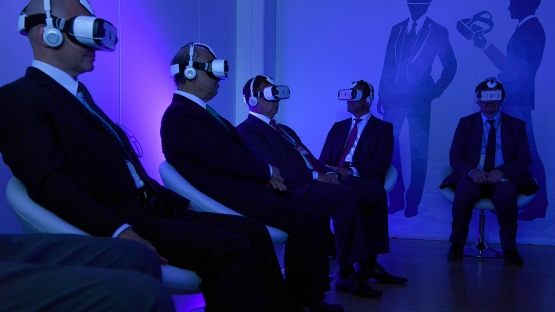During the plenary session over 50 delegations took part in the debate. Their full statements are available here.
The 2015 Scientific Forum on Atoms in Industry concluded today with an open forum, which saw a number of questions from the audience on topics such as non-destructive testing, mining, role of e-beams accelerators, sterilization techniques for medical items using radiation, the latest nuclear applications for food preservation, the use of natural polymers, strengthening regulatory and legislative framework, global warming and water pollution, as well as issues pertaining to industrial safety and improving private-public partnership in industry. “Nuclear science and technology can contribute to the 13 of the 17 areas of the Sustainable Development Goals and we want to play a role,” said Yukiya Amano, IAEA Director General in his concluding remarks.
At a well-attended side event, the IAEA launched the new smartphone App for cancer staging that will be able to identify the stage of cancer quickly and accurately. This app is accessible, easy to use and absolutely free of charge. The Agency has developed this unique app for cancer staging. It allows harmonized communication about cancer, which will facilitate appropriate and personalized care among multidisciplinary teams involved in cancer management.
Africa’s Energy Needs and the Potential Role of Nuclear Power reported on recent developments in African Member States considering, embarking on, or expanding national nuclear power programmes and also provided an overview of IAEA support to newcomers and expanding countries, including Integrated Nuclear Infrastructure Review (INIR) missions to African countries.
Small Modular Reactors: Option for Safe Nuclear Power Technology for Near-term Deployments highlighted the design, safety, regulation, and operation aspects of current small modular reactor designs to promote competitive, safe and sustainable nuclear power technology for near-term deployments.
Women in All Things Nuclear — the Future Workforce was a panel discussion on initiatives that address its goal of gender parity in all areas of the IAEA, trend of youth retention in the fields of science, technology, engineering and mathematics, and discuss the gaps between university graduate students and young professionals in the nuclear field.
The 5th Nuclear Operator Organization Cooperation Forum — Nuclear Power Generation in the Next Decade: Challenges and Solutions for 2015– 2025 discussed the status of operating NPPs for safe, reliable and efficient power generation. In particular, delegates discussed the technical and programmatic aspects of NPP operation that include plant performance, effective operation and maintenance management; human resource development programme; social and economic impacts to long term operation of nuclear power plants; and post-Fukushima action and response to robustness and compliance.
Other side events held on Wednesday include:
- Developing solutions for deep geological disposal of high level waste and spent nuclear fuel focused on the safe radioactive waste management solutions that are in operation around the world, with the exception of deep geological disposal for high level waste or spent nuclear fuel. This event provided a brief overview on the current status on the kind of solutions for deep geological disposal of high level waste and spent nuclear fuel.
- Managing Soils for Climate-Smart Agriculture: Celebrating the International Year of Soil highlighted the work of the Joint FAO/IAEA Division of Nuclear Techniques in Food and Agriculture in climate-smart agriculture as it relates to soil and water management as well as the role of the Agency’s in enhancing national and regional capacity in Member States. Future challenges and the crucial roles of isotopes in addressing climate change issues.
- Introduction to EPRIMS — the New Emergency Preparedness and Response (EPR) Information Management System presented the new web-based EPR information management system. Delegates were shown how to self-assess their EPR arrangements and share information among Member States.
- Friends of Responsible Uranium Mining (FoRUM): Meeting the Challenges of Competing Stakeholders’ Expectations explored how the challenges of different and sometimes conflicting expectations of different stakeholders in uranium mining can be met both in established markets and in newcomer countries.
- The Future We Want: Comprehensive Cancer Control in the Post-2015 Agenda focused on increased global action on cancer in the post 2015 global health agenda. (View photos.)
- The Global Nuclear Safety and Security Network (GNSSN) Plenary Meeting reported on the development and the progress of the networks hosted by or linked to the GNSSN. It also discussed the sustainability of national and regional capacity building programmes and the development of a global partnership on nuclear safety.
- Borehole disposal — A Safe and Effective Endpoint for Disused Sealed Radioactive Sources (DSRS) reviewed the recent developments and ongoing projects in the borehole disposal concept is a comprehensive engineered system that is a cost effective method for the safe, secure and permanent disposal of DSRS.
- Global Status of Spent Fuel and Radioactive Waste Inventories and Management Strategies: The Status and Trends Project provided information on the collaboration between the IAEA, the OECD Nuclear Energy Agency and the European Commission on a two-year project to produce a report on current global inventories of spent fuel and radioactive waste and on strategies for the management of these materials.
- An Italian/IAEA Joint Contribution to Nuclear Security: The International School on Nuclear Security at the ICTP in Trieste highlighted the experience of the International School on Nuclear Security, a joint Government of Italy/IAEA project at the International Centre for Theoretical Physics in Trieste, Italy.
- Exchange of Regulatory Experiences among Ibero-American Forum of Radiological and Nuclear Regulatory Agencies (FORO) and Other Regional Regulatory Associations and Networks presented achievements to strengthen regulatory organizations within the scope of its cooperation with the IAEA, to discuss regional strategies and to identify possible lines of cooperation with other regional associations and networks.


